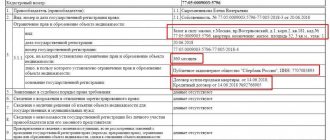Legal nuances of real estate exchange
The rights and obligations of citizens when making real estate exchange transactions are regulated by Article 31 of the Civil Code of the Russian Federation.
Without going into details, according to the law, one owner transfers his property to another, and he, for his part, provides him with his property. Next, all papers are reissued, and mutual settlements are made if necessary.
There are two types of exchange:
- Equal . When the assessed value of both properties is the same;
- Unequal . When the price of one property is less than another.
In an unequal transaction, both parties agree among themselves on the amount of additional payment for the property. The conditions and procedure for the mutual exchange of property are formalized through an agreement, which is certified by a notary. This ensures that all agreements specified in the agreement are respected.
How to change an apartment to a house? Main stages of exchange
The law does not provide for any strict rules and procedures for the exchange of real estate. The parties themselves can agree on the procedure for the transaction; they can conduct it in person or remotely. There are no restrictions on the amount of additional payments in case of an unequal exchange - the parties agree on this themselves (only it is necessary to specify the amount of the additional payment in the contract).
The process of exchanging an apartment for a house includes several stages:
Property valuation
Owners are advised to first obtain an independent appraisal of their property.
To do this, you should contact an appraiser. They can professionally assess the current wear and condition of objects, their location, pros and cons, and surrounding infrastructure. Based on the data obtained, the market value of housing is determined.
Cooperation with us when exchanging housing
It would seem that you can exchange a one-room, two-room, or three-room apartment without professional help. However, in reality this is a serious procedure and should be approached with all responsibility. In addition, the situation in the housing market is not always stable. Depending on the season, the economic situation in the country and innovations in legislation, prices may rise or fall.
What documents will owners need?
To conclude an agreement to exchange an apartment for a house (and vice versa), you need to prepare the following package of documents:
- Documents confirming ownership of real estate: certificate, USRN extract, purchase and sale agreement or inheritance or gift agreement;
- Extracts from the BTI and from the passport office;
- Consent (permission) of the husband/wife to complete the transaction and waiver of claims to the property from other residents;
- Cadastral passport;
- Home Book;
- Passport;
- An extract from the housing office (or homeowners' association, management company, SNT) about the absence of debt for utility services;
- Documents for land ownership, cadastral passport;
- The act of surveying a land plot.
All documents must be provided in originals. Next, copies are made of them and certified by a notary.
Methods
There are several options for sharing space. Check out each of them and choose the one that suits your case.
Barter agreement
In order to formalize such an agreement, it is necessary for BTI employees to evaluate the value of your room and the value of the real estate for which the exchange is intended to be made.
If the amounts are proportionate, then an exchange contract is drawn up, according to which (Article 567 of the Civil Code) one party transfers real estate into the ownership of the other, and the latter, in turn, carries out a similar transaction.
If the amounts are disproportionate and one type of real estate is more expensive, then you can draw up an exchange contract with an additional payment by one of the parties.
The fact of additional payment must certainly be indicated in the contract, otherwise it will not be possible to prove in court that additional funds were demanded from the opponent.
Purchase and sale
The transaction can be concluded through a purchase and sale agreement.
In total, there are two equivalent contracts under this agreement .
Most often, this method is used when the surcharge is too high, and the owner of expensive property does not trust the exchange contract.
The disadvantage of this method is the tax on the sale of real estate, which will have to be paid twice.
Realtor help
In accordance with this method, a third party . Most often, she is represented by a realtor.
If you definitely want to exchange for a specific plot or house, but the owners of these properties do not want to exchange for a room, even with an additional payment, then you can resort to the help of a realtor.
He buys the option you are interested in for a small deposit on your part. In the meantime, you sell your premises to other persons (time is allotted for this) and buy the purchased property from a realtor, taking into account a small percentage for his services.
Subtleties of real estate exchange and pitfalls
From a legal point of view, an exchange agreement differs from a purchase and sale agreement. First of all, when exchanging real estate, both participants simultaneously have the status of Seller and Buyer. But that's not all:
- If the price of each object is not specified in the document, then the exchange is considered equal. (be careful - many owners did not take this point into account and fell into a “trap”);
- The housing becomes the property of another owner only if all clauses of the contract are observed, the deed is signed and the state registration of ownership of both objects is completed in Rosreestr (thus the law “insures” the owners against fraudulent schemes - when one buyer has already received the property, but the second has not yet );
- In addition to signing the Act on the execution of the exchange, the parties also need to sign another Act confirming the execution of the counter transaction if the other party wants to transfer the property later (Article 328 of the Civil Code of the Russian Federation);
- If, according to a court decision, the exchange agreement was executed incorrectly, or the exchange was made without the consent of one of the owners, then such a transaction is declared invalid. And the property is returned to its original owners;
- When making an unequal exchange with an additional payment (which happens quite often when deciding to exchange an apartment for a house), the owner of the house is required to pay income tax of 13% on the profit received. In case of an equivalent exchange, there is no need to pay tax;
- As already mentioned, when the rights to private houses are transferred, the rights to the land plot are automatically transferred. Here it is important for the apartment owner, even before signing the exchange agreement, to check whether the previous owner has violated the laws on the development of plots (according to its category and purpose). Otherwise, there is a risk of losing invested funds and land.
Transaction costs
Unlike ordinary purchase and sale transactions, during real estate exchange transactions, owners incur additional costs:
- If the area of one or both objects is more than 100 square meters. m, then a state duty is charged - 0.5% of the cost of a more expensive object;
- If the object is changed twice in a year, the amount of the duty becomes even higher - and you need to pay up to 2.5% of the cost;
- If the housing area is less than 100 sq. m., and this is the first housing exchange transaction of the year, then you do not need to pay a fee;
- Expenses for notary services;
- Income tax (if the transaction is unequal) - in the amount of 13% of the profit.
All costs of paying fees and notary services are borne by both participants in the process.
Who is eligible?
On house
Is it possible to exchange a room for a house in the village? A house is a residential building located on a plot of land. In accordance with Article 130 of the Civil Code of our country, a house is real estate, as it fits the description of this category of property. And the Civil Code allows for various transactions with real estate , but only if certain conditions are met.
If you want to exchange your room for a house, then you must be the owner of the property that you want to offer in exchange.
If there is more than one owner, then other persons, in agreement with you, can also carry out a similar transaction.
Heirs of real estate (premises) have the right to exchange , who enter into their right only six months after the death of the testator.
The barter contract is provided for in Article 567 of the Civil Code and, in accordance with it, the parties transferring various objects to each other must have the right not only to use these things, but also to own and dispose of them. Otherwise, no agreement can take place.
For a plot of land
The same aspects apply to the land plot. You can often see an advertisement: “I will exchange a room for a plot.” How is this possible?
Being real estate, the plot passes to another owner and is alienated only in a situation where it has an absolute right of ownership and disposal , supported by documentation.
How to draw up a contract correctly?
A real estate exchange agreement must be drawn up only in writing. It is important to do this correctly, otherwise the agreement will be invalidated and the deal will be cancelled.
The document must indicate the following points:
- Date and place of the transaction;
- Information about the owners - full name, registration address;
- Information about real estate objects participating in the exchange - location, number of floors, entrance number, number of rooms, infrastructure facilities located nearby, etc.;
- Information confirming the ownership of housing;
- The amount of additional payment that must be made by the owner whose property is cheaper;
- Consequences of breaking the deal;
- Force majeure;
- The preferred method of resolving disputes in case of non-compliance with the terms of the agreement by one of the parties (court, arbitration, out-of-court procedure);
- Personal signatures of the parties;
- Signature of the notary certifying the contract.
After signing the agreement, each party receives two notarized copies of the agreement. One of which is subsequently submitted for registration to Rosreestr.
Exchange rules
Land that is owned by a citizen or legal entity can always become the object of a compensated transaction. Moreover, both codes of the Russian Federation (Civil Code and Land Code) provide the opportunity to commit such an act free of charge. Those who do not use the plot all the time, such as tenants, do not have such opportunities.
And the fact that a plot of land is classified by the legislator as property objects forces its owner to undergo the registration procedure at the Rosreestr branch.
The exchange itself is characterized by the following key features:
- the participants in such a transaction mutually transfer from one to the other the ownership rights to the objects they exchange;
- It is not at all necessary to exchange the allotment for a similar property asset; it is allowed to display residential (apartment or house) or non-residential premises, any transport, etc. as an exchange item;
- An important condition of the contract is the requirement to pay monetary compensation from the party to the agreement whose property turned out to be cheaper in value.
The land plot becomes the subject of an exchange agreement, regardless of its purpose. Any residential or non-residential buildings can be built on it, and it can have an agricultural purpose.
Agricultural lands are territories located outside populated areas.
The new owner does not have the right, without special permission from the local authority, to change the legal regime of land use, which is indicated in the title document.
Cases when an exchange transaction may be canceled (not take place)
According to the Civil Code, there are a number of cases when it is impossible to exchange real estate:
- The barter agreement was declared invalid in court;
- One of the owners was sued;
- If a building or living space is considered unsafe, it is demolished;
- If the property has official status or is a dormitory;
- If a participant in the transaction was expelled from the housing cooperative.
If there is at least one of the violations described above, the contract will be declared invalid. And it will be cancelled, and all data in Rosreestr regarding real estate rights will return to the previous owners.
Did you find this article helpful? Please share it on social networks: Don't forget to bookmark the Nedvio website. We talk about construction, renovation, and country real estate in an interesting, useful and understandable way.
Registration procedure
The first stage of registration is signing the contract. In some situations, it must be certified by a notary:
- If one of the owners is a child.
- If not the entire apartment, house or plot is involved in the exchange, but only a share.
In other cases, the certification is voluntary. If a minor is involved in the transaction, permission from the guardianship authorities will also be required.
To get it, you need to contact the territorial office with an agreement. There they will check him, and if they decide that the child’s situation will not worsen, they will issue consent.
With the signed agreement, you need to contact Rosreestr to record the transfer of ownership rights. It can be done:
- in person at any territorial office;
- at the MFC office;
- by mail;
- through the Rosreestr website;
- through the government services portal.
3 days after receiving the documents by Rosreestr employees, extracts will be ready. They replace cadastral passports and property certificates issued previously.
From this moment on, the owners are considered to have entered into new ownership.
List of required documents
When signing the exchange agreement you will need:
- owner passports;
- housing ownership documents;
- and about the grounds of this right;
- cadastral passport for the house and plot and for the apartment;
- certificates of absence of utility debts (for both properties);
- extracts from house books.
When registering the transfer of rights, an application is filled out. You will need a signed contract and the documents required when signing it. Additionally you will need to provide:
- Receipt for payment of state duty (1,000 rubles).
- A receipt for receipt of money, if required by the terms and conditions.
- Consent of the spouse if any real estate is joint property.
- The consent of the guardianship authorities, there is one of the owners - the child.
If the application is submitted via the Internet, electronic copies of documents are sent, and the originals are presented when issuing an extract. And when sent by mail, notarized copies are attached to the application.
Tax
When exchanging real estate, the same rules apply regarding taxes as when selling. You must pay personal income tax. The tax base is the price of the house or apartment, the ownership of which is lost. The surcharge is also included (for the one who received it).
The cost may be taken into account:
- Specified in the contract, if it is not less than 70% of the cadastral value.
- Cadastral value in other cases.
This amount must be paid no later than July 15 of the following year. Before this (by April 30 of the following year), you must submit a tax return.
But there is an opportunity not to pay or significantly reduce taxes. First of all, personal income tax is not paid if the property has been owned for more than three years.
If the ownership period is longer, the owner has the right to take advantage of the tax deduction (if he has not used it before).
The amount of this deduction is determined, at the request of the taxpayer, as one of the following options:
- No more than 1 million rubles from the cost of housing.
- Documented expenses for the acquisition of the sold property.
Letters from the Ministry of Finance No. 03-04-08/4-310 dated September 19, 2012 and No. 03-04-RZ/15807 dated April 8, 2014 state that this rule can also be applied to an exchange agreement. That is, personal income tax will need to be paid only on the amount of the additional payment received, if any.
Risks
When exchanging, there are the same risks as when buying and selling a home. The transaction may be declared invalid and terminated. To prevent this from happening, you need to carefully check your documents. Particular attention should be paid to the following cases:
- One of the owners is a child. Guardian consent is required.
- Receiving an inheritance, especially a recent one. You have six months from the date of death to claim the property of the deceased. But if the heir did not know about this for a good reason, the period may be increased.
- The owner is married. If the house or apartment is jointly owned, it is necessary to obtain the consent of the spouse.
- And if a share of real estate is involved in the exchange, they must first be offered to the owners of other shares. And only if you receive a refusal can you negotiate with strangers.
It is also possible to challenge the transaction if one of the parties (or its heirs) decides that the exchange is not equivalent. If this can be proven in court (and if there was no additional payment), the exchange may be terminated. Therefore, it is advisable to obtain an independent assessment of both objects before starting registration.
The advantage is that when the transaction is terminated, the exchange participant is in a more advantageous position than the buyer. He gets his property back. Of course, time will be lost for registration and termination, as well as money for registration.
Collecting money when canceling a sale can be quite difficult. Sometimes sellers return them in parts, and this can take years.










